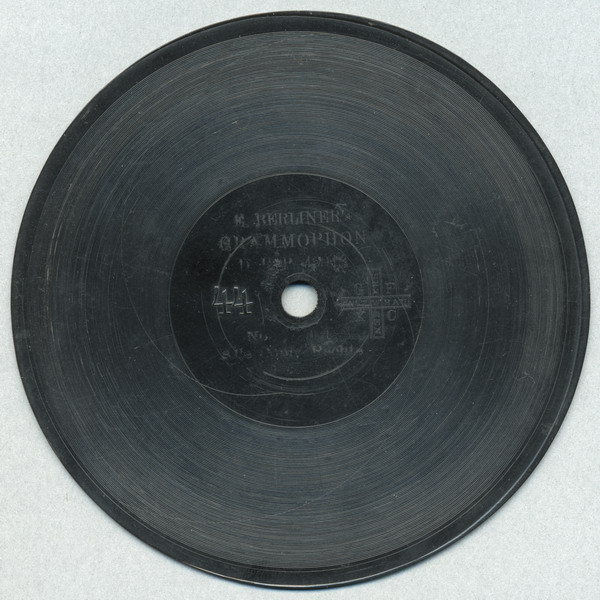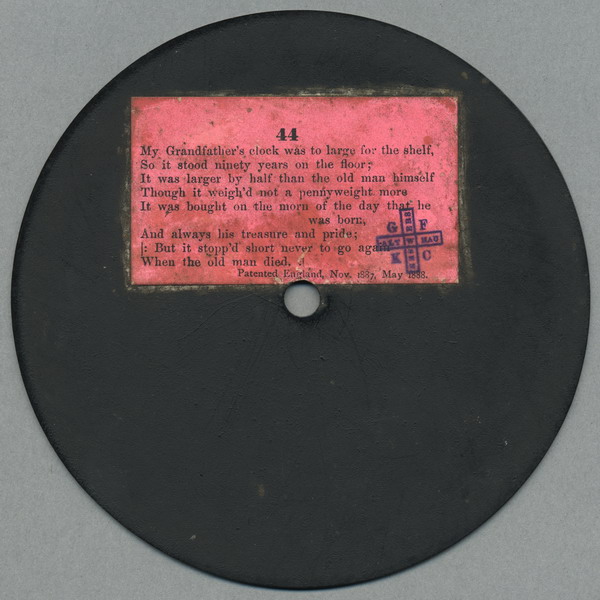

|
|
|||
|
Retour à la page d'accueil des disques Berliner Gramophone de 12,5 cm |
|||
|
|
|||
Le catalogue en ligne des disques Berliner Gramophone de 12,5 cm
The Gramophone five inch Berliner records online catalogue
MY GRANDFATHER'S CLOCK


To listen (fragment)
Berliner 5 inch record #44
My Grandfather's Clock
Written By Henry Clay Work
Copyright UnknownMy grandfather's clock
Was too large for the shelf,
So it stood ninety years on the floor;
It was taller by half
Than the old man himself,
Though it weighed not a pennyweight more.
It was bought on the morn
Of the day that he was born,
And was always his treasure and pride;
But it stopped short
Never to go again,
When the old man died.
Ninety years without slumbering,
Tick, tock, tick, tock,
His life seconds numbering,
Tick, tock, tick, tock,
It stopped short
Never to go again,
When the old man died.
In watching its pendulum
Swing to and fro,
Many hours had he spent while a boy;
And in childhood and manhood
The clock seemed to know,
And to share both his grief and his joy.
For it struck twenty-four
When he entered at the door,
With a blooming and beautiful bride;
But it stopped short
Never to go again,
When the old man died.
Ninety years without slumbering,
Tick, tock, tick, tock,
His life seconds numbering,
Tick, tock, tick, tock,
It stopped short
Never to go again,
When the old man died.
My grandfather said
That of those he could hire,
Not a servant so faithful he found;
For it wasted no time,
And had but one desire,
At the close of each week to be wound.
And it kept in its place,
Not a frown upon its face,
And its hand never hung by its side.
But it stopped short
Never to go again,
When the old man died.
Ninety years without slumbering,
Tick, tock, tick, tock,
His life seconds numbering,
Tick, tock, tick, tock,
It stopped short
Never to go again,
When the old man died.
It rang an alarm
In the dead of the night,
An alarm that for years had been dumb;
And we knew that his spirit
Was pluming his flight,
That his hour of departure had come.
Still the clock kept the time,
With a soft and muffled chime,
As we silently stood by his side.
But it stopped short
Never to go again,
When the old man died.
Ninety years without slumbering,
Tick, tock, tick, tock,
His life seconds numbering,
Tick, tock, tick, tock,
It stopped short
Never to go again,
When the old man died.---
Henry Clay Work Complete Songs and Choruses : http://www.pdinfo.com/source/K543125.htm
Henry Clay Work (October 1, 1832 - June 8, 1884) was an American composer and songwriter. Very little is known about him. He was born in Middletown, Connecticut, the son of a prominent opponent of slavery, and he too was also an active abolitionist and Union supporter. His home became a stop on the Underground Railroad, and was instrumental in the escape of several thousand slaves seeking freedom, for which his father was imprisoned.
Henry was self taught in music. By the time he was 23, he was working as a printer in Chicago. He specialised in setting musical type. It was said that he composed in his head as he worked, without the assistance of a piano, using the noises of the machinery as inspiration. He was also compiling lyrics. His first published song was "We Are Coming, Sister Mary", which eventually became a staple in Christy's Minstrels shows.
He produced much of his best material during the Civil War years. In 1862 he published "Kingdom Coming" using his own lyric based upon snippets of Negro speech which he had heard. This use of dialect (Irish too was a favourite) tended to limit the appeal of Work's works and hastened their decline into obscurity. However, "Kingdom Coming" appeared in the Jerome Kern show "Good Morning Dearie" on Broadway in 1921, and it was heard in the background in the 1944 Judy Garland picture "Meet Me in St Louis". 1862 saw "Grafted Into the Army", followed in 1863 by "Babylon is Fallen", "The Song of a Thousand Years" and "God Save the Nation". The 1864 effort "Wake Nicodemus" was popular in minstrel shows. In 1865 he wrote his greatest hit, inspired by Sherman's march to the sea, "Marching Through Georgia". This song was immensely popular, the million sheet-music sales being virtually unprecedented. It is a marching song almost sans pareil, having been pressed into service regularly from that day to this, not least by Princeton University as a football 'Fight' song. Timothy Shay Arthur's play Ten Nights in a Barroom, had the song "Come Home, Father", a dirgesome ditty bemoaning the demon drink which is rather too mawkish for modern tastes, but which has always gone down well at Temperance Meetings.
Settling into a groove with his sentimental balladry, Work had significant post-Civil War success with the likes of "The Lost Letter" and "The Ship That Never Returned". A massive hit was "My Grandfather's Clock", published in 1876, which was introduced by Sam Lucas in Hartford, and went on to secure more than a million sales of the sheet music.
Henry Clay Work died in Hartford, and was inducted into the Songwriters Hall of Fame in 1970.
Sources, and more details on : http://en.wikipedia.org/wiki/Henry_Clay_Work